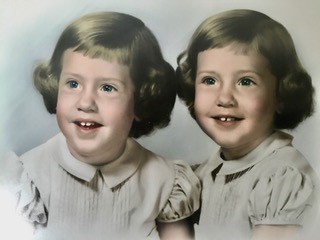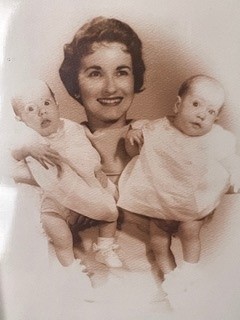When I Adopted Them

by Julie Ryan McGue
I have a confession to make. I was a holdout.
My twin sister and I knew at a very early age that we were adopted, but we generally avoided thinking or talking about it. It wasn’t until I chased down my adoption story at age forty-eight– filtered it through the lens that comes with being middle-aged and a parent–that several thoughts crystalized for me.
Until the last ten years, when I began researching my adoption, my status as an adoptee had been a detail that I kept private. Beyond extended family, discussing my adoption with others was uncomfortable for me. I needed to know someone quite well and trust them, before revealing personal information like my birth history.
Adoptees like me, from the 60s and 70s, were usually the products of closed adoptions. We knew very little if anything about our background. We had not been given any health history or genealogy, and we were prohibited from communicating with our family of origin. Most of us didn’t have a clue about the circumstances that led to our being placed in a closed adoption.
While I kept my adoption hidden from others, I inwardly suppressed the implications as well. As a young girl, I couldn’t bring myself to dwell on why some woman would not want to parent two perfect little girls. Had we done something wrong or was it that two were too many? As a teenager–when boys and sex were frequent thoughts–I didn’t want to think about how I came to be. So, I speculated that my adoption was a result of teen pregnancy. Until I learned the truth mid-way through life, that made-up story satisfied me; it silenced the internal bantering and wondering.
Besides holding back from friends and family and believing a made-up story, I did not fully embrace the idea that my adoptive parents were legitimately mine. You see, there was a part of me that was waiting for my birthparents to return and take me back to where I truly belonged. And when they showed up, I imagined that they would be everything I wanted them to be. These loosely held beliefs meant that for most of my life, I had not been in an honest relationship with myself, or with my adoptive parents. Sadly, because I couldn’t let go of my ‘first’ parents, I wasn’t ever ‘all in’ with Mom and Dad.
 If you asked my adoptive mother what I was like as a child, she’d say I was a reserved, serious, and contemplative child. I was prone to taking off in search of a quiet spot in the three-bedroom, two-bath home I shared with my five siblings and parents. I was forever on my bicycle renewing library books or hanging out at the park across the street from our chaotic household. I craved independence and privacy; I relished being alone with my thoughts or creating spaces where I was in control of my actions and their consequences.
If you asked my adoptive mother what I was like as a child, she’d say I was a reserved, serious, and contemplative child. I was prone to taking off in search of a quiet spot in the three-bedroom, two-bath home I shared with my five siblings and parents. I was forever on my bicycle renewing library books or hanging out at the park across the street from our chaotic household. I craved independence and privacy; I relished being alone with my thoughts or creating spaces where I was in control of my actions and their consequences.
As a young girl, most places that I went, my twin went too. I was never in search of a best friend because I was born with mine. My twindom was an advantage in life, one that I still count as the biggest blessing to come out of my closed adoption. My adoptive mother was always on the outside of our duo. And because I was holding out for my birth mother to re-enter my life, my heart treated my mom as a temp or a stand-in. While this sounds unfair, it’s an honesty I came to acknowledge later in life.
Yet, somewhere along the bumpy road of searching for my birth relatives, I realized that something astounding had happened: I had accepted my adoptive parents as my “real” parents. In a sense, I had adopted them. Perhaps this transformation occurred during my birth mom’s denial of contact. Maybe it happened while I waited for the judge to order on my behalf that I deserved my first family’s health history. I suspect that when I discovered my birth mother’s lies and when my birth father refused to acknowledge me, I had officially leaped. Regardless of when this shift transpired, I came to see my adoptive parents for who they were: two honest, decent people who had loved and nurtured me into adulthood.
Now as a middle-aged woman, I readily admit that my “real” parents are the ones who cared for me my entire life. I am grateful to my adoptive parents for the many opportunities they created for me, the love they freely shared, and the sense of family and belonging they imparted. I feel fortunate that they played such an integral role in my life. They are mine, and I belong to them.
It isn’t my fault that I was an adoption holdout. The closed adoption system baked that into the cake. One of the many results of my adoption search is that I have reflected upon my relationships and where I fit in with my family and community. I’m relieved that the subject of my adoption is no longer off-limits both within myself and with others. Most importantly, I accept my birth mother’s role in giving me life and revere my adoptive parents for giving me a life.
No more holding back!
